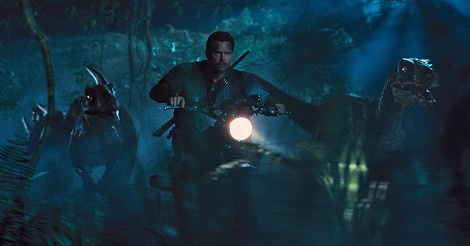
For the rest of July, we will be taking a look at the Jurassic Park films, mainly Jurassic Park and Jurassic World. We will be discussing the films in detail, so spoilers are possible but will be kept to a minimum.
Last week, we looked at some of the conflicts in the Jurassic Park stories; conflict is good for narratives, but it isn’t necessarily at the heart of science. Collaboration is at least as crucial, probably more so. A diversity of interests and non-overlapping priorities can be useful for refining ideas and keeping things balanced, but it is hard to build anything out of conflict. If you want to, say, send a probe on a journey of 9 years and 3 billion miles, you need a lot of people to work together; the same applies to studying 2 billion years of biology or populating a theme park with extinct dinosaurs.
Sharing skills and resources is the most obvious form of collaboration, whether it is Drs. Grant and Sattler working together on a dig prior to entering Jurassic Park, Owen and Claire working together to find her missing nephews in Jurassic World, or even the velociraptors coordinating their movements when hunting prey. As with so many stories, the heroes succeed when they work together, while selfishness or at least a failure to cooperate leads to problems. Sometimes it is deliberate, as when Hoskins in Jurassic World or Nedry in Jurassic Park pursue their own agendas, and sometimes it is an oversight, like the failure to consult paleobotanists when selecting plants to grow.
Peer review, another aspect of collaboration, is critical to the success of a large endeavor; we are all finite and fallible and can benefit from double checks. Thus Dr. Hammond brings in external scientists to evaluate his park and Masrani asks Owen Grady to check over the containment of the Indominus Rex. When characters avoid peer review, such as Nedry not letting anyone else look at his code, they tend to be hiding something (not always true in real life).
The most ambitious projects will outlive us; contributors need to pass along expertise and wisdom or the project dies with them. Although not strictly career-oriented, the kids in the films are most directly mentored. Dr. Grant is reluctant to have anything to do with them at first, but over the course of Jurassic Park he comes to appreciate their contributions and trusts them with opportunities to grow their own skills. In Jurassic World, older brother Zach realizes he has life skills he can impart to his younger brother, making their relationship more constructive and less antagonistic.
Finally, the theme parks themselves represent a form of collaboration between the scientists and the public. While ill-conceived in some of the particulars, the overall vision of providing education and the opportunity to observe dinosaurs personally is a worthy one. The relationship may be asymmetrical, but I do think we have an obligation to make our scientific discoveries accessible to the public so that everyone has the chance to benefit, not just materially, but intellectually as well.
Is there a culture of collaboration in the context where you work or study? How do you incorporate collaborative elements like peer review, mentoring, and public communication into your work?
Andy has worn many hats in his life. He knows this is a dreadfully clichéd notion, but since it is also literally true he uses it anyway. Among his current metaphorical hats: husband of one wife, father of two teenagers, reader of science fiction and science fact, enthusiast of contemporary symphonic music, and chief science officer. Previous metaphorical hats include: comp bio postdoc, molecular biology grad student, InterVarsity chapter president (that one came with a literal hat), music store clerk, house painter, and mosquito trapper. Among his more unique literal hats: British bobby, captain’s hats (of varying levels of authenticity) of several specific vessels, a deerstalker from 221B Baker St, and a railroad engineer’s cap. His monthly Science in Review is drawn from his weekly Science Corner posts — Wednesdays, 8am (Eastern) on the Emerging Scholars Network Blog. His book Faith across the Multiverse is available from Hendrickson.

Leave a Reply